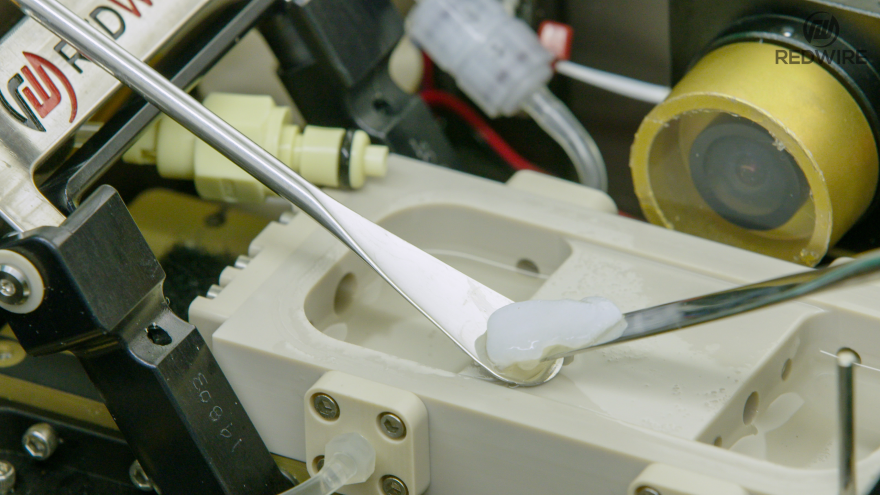The 3D printing process uses raw materials like plastic to build three-dimensional objects. Bioprinting basically does that using living cells and various biomaterials.
Redwire Corp. is testing the capacities of bioprinting in space because the company expects the conditions aboard the ISS, which experiences very little gravitational pull in orbit above the Earth, could lead to breakthrough improvements in efforts to print complex human tissues.
“You’re not as limited as you are here on the ground,” said John Vellinger, Redwire's president of In-Space Industries. “And so we can print a much more complete structure in microgravity than you can here on Earth.”
Recently, the company reached a milestone when its 3D BioFabrication Facility aboard the ISS successfully created a meniscus with the assistance of three astronauts from NASA and one from the United Arab Emirates.
After it was printed, the meniscus was placed into a special processor on the space station to further develop the tissue over a two-week span.
The 3D BioFabrication Facility that made the cartilage originally was designed by Techshot Inc., a company based in Floyd County that Redwire acquired in 2021.
Redwire, which is headquartered in Florida, still has operations in the county and recently announced plans to build a 30,000-square-foot research facility at the nearby Novaparke Innovation and Technology Campus.
“The Redwire office here in Southern Indiana has, you know, some outstanding engineers and scientists,” said Vellinger, who cofounded Techshot. “And we’re very proud of their talent and their hard work to be able to get this technology to actually come to fruition in space.”
Redwire’s manufactured meniscus came down to Earth in early September, when a few astronauts and a Russian cosmonaut brought it with them as they flew back from the ISS.
The initial review of the project’s results have been positive, Vellinger said. More detailed analyses will be conducted in the coming months.
Someday, Vellinger said they hope human tissues — and perhaps even entire organs — might successfully be printed in space and then transplanted into patients on Earth.
For example, a patient’s torn meniscus — which is a common injury, especially among military personnel — eventually could be repaired using a bioprinted one.
“We’ve got a long way to go, but you’ve got to take the steps to get there. By being able to actually print this meniscus, it was a huge step forward for Redwire in this process of biotech printing in space,” he said.
“That’s what captivates the imagination. We do have the capability to be able to print tissues that cannot be printed here on the ground.”






